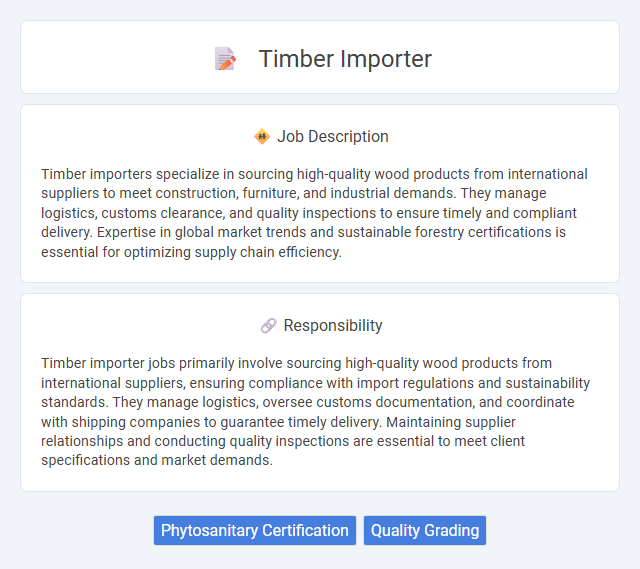
Timber importers specialize in sourcing high-quality wood products from international suppliers to meet construction, furniture, and industrial demands. They manage logistics, customs clearance, and quality inspections to ensure timely and compliant delivery. Expertise in global market trends and sustainable forestry certifications is essential for optimizing supply chain efficiency.
Individuals with strong organizational skills and attention to detail will likely thrive as timber importers, as the role involves coordinating shipments and managing regulatory compliance. Candidates who enjoy negotiation and have a keen understanding of international trade laws may find this job particularly suitable. Those uncomfortable with constant communication and fast-paced environments might face challenges adapting to the demands of the profession.
Qualification
A timber importer must possess a strong understanding of international trade regulations, customs procedures, and supply chain logistics to efficiently manage the import process. Expertise in wood species identification, quality standards, and sustainable sourcing certifications such as FSC or PEFC is essential for ensuring compliance and product integrity. Proficiency in negotiation, market analysis, and inventory management enhances the ability to secure competitive pricing and maintain steady supply in fluctuating timber markets.
Responsibility
Timber importer jobs primarily involve sourcing high-quality wood products from international suppliers, ensuring compliance with import regulations and sustainability standards. They manage logistics, oversee customs documentation, and coordinate with shipping companies to guarantee timely delivery. Maintaining supplier relationships and conducting quality inspections are essential to meet client specifications and market demands.
Benefit
Timber importer roles likely offer benefits such as access to a diverse supply chain and opportunities for international trade experience. Candidates may gain expertise in quality assessment and regulations related to sustainable forestry practices. There is a probable advantage in networking with global suppliers and expanding market knowledge, contributing to career growth in the timber industry.
Challenge
Timber importer jobs likely involve the challenge of navigating complex international regulations and customs procedures to ensure timely delivery. Managing fluctuating market demands and price volatility may create uncertainty in supply chain planning. Successfully coordinating logistics and maintaining quality standards probably requires strong problem-solving skills and adaptability.
Career Advancement
Timber importer roles offer significant career advancement opportunities through expertise development in global supply chain management, negotiation skills, and market analysis within the forestry industry. Professionals can progress to senior management positions such as Supply Chain Director, Procurement Manager, or Regional Sales Director by demonstrating strong knowledge of international trade regulations and sustainable timber sourcing. Continuous learning in environmental compliance and logistics technology further enhances prospects for leadership roles and strategic business development.
Key Terms
Phytosanitary Certification
Timber importers must secure Phytosanitary Certification to ensure imported wood products comply with international plant health regulations and prevent the spread of pests and diseases. This certification verifies that timber shipments are free from harmful organisms, meeting the standards set by the International Plant Protection Convention (IPPC). Efficient management of Phytosanitary Certification minimizes customs delays and supports sustainable forestry trade practices.
Quality Grading
Timber importers prioritize quality grading to ensure compliance with international standards such as the FSC and PEFC certifications. Accurate grading assesses timber attributes like density, moisture content, and strength to determine suitability for construction or manufacturing. This process minimizes defects, optimizes cost efficiency, and ensures high-quality raw materials for end-users.
 kuljobs.com
kuljobs.com